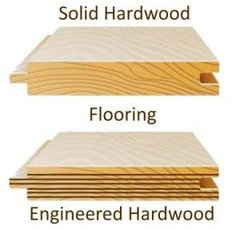Hardwood floor vs. engineered hardwood?
Heidi Zervakis
6 years ago
Featured Answer
Sort by:Oldest
Comments (27)
Related Discussions
Laminates for flooring pros and cons
Comments (3)I never use laminate. Overall it looks too "manufactured". It can, at best, be sanded and refinished once. In Texas, I am paying $7/sf for real hardwoods labor & material. Some laminates are $5.00 material only. All laminates look fake to me....See MoreFloor for condo
Comments (8)Is the condo a wood structure or is there a concrete subfloor? If you have concrete, you will need to either float the hardwood (make sure you look at floating engineered...not all are designed to float) or a glue down floor (again, make sure the hardwood has the ability to be glued in place...not all of them are designed that way). If the condo board has rules about acoustic underlay, then the cheapest install is a floating floor over a high-end underlay. Gluing down hardwood over acoustic underlay is VERY expensive (double the glue and double the labour and double the length of installation)....See Moreneed help in choosing flooring
Comments (2)https://www.houzz.in/magazine/which-tiles-are-perfect-for-indian-floors-stsetivw-vs~86143723 https://www.houzz.in/magazine/how-to-use-marble-in-9-unconventional-ways-stsetivw-vs~77333785 You can get in touch with me at 9891993392 or poojakhanna224@gmail.com...See Morewant to change the flooring and living room interior
Comments (14)Ashish That is a nice idea. However if you are going with light walls, I would say go darker with your furniture colour. If you use white or off white wall colour, go with a darker grey sofa. Though not very dark but at least 2-3 tones darker than your walls. Go with khadi texture on sofa covers. It looks very nice and is quite trendy. https://www.houzz.in/photos/vikram-phvw-vp~280 Something like this is a good option (regarding colour and texture) Mounting the tv on the wall is also a good option. What i will ask you to change is your coffee table. Replace it with with a glass or a wooden nesting table. Go for a set of 2 round ones with walnut polish (if it is wood) .Keep a small dari rug under it. use you wall paper on the wall on which you are mounting your tv or on the wall directly adjacent to it. separate your dinning and living areas....See MoreUser
6 years agoHeidi Zervakis
6 years agojhmarie
6 years agoHeidi Zervakis
6 years agoUser
6 years agoUser
6 years agoSJ McCarthy
6 years agoUptown Floors
6 years agolast modified: 6 years agoChessie
6 years agojhmarie
6 years agoChessie
6 years agolast modified: 6 years agogtcircus
6 years agolast modified: 6 years agoNational Hardwood Flooring & Supplies
6 years agolast modified: 6 years agoG & S Floor Service
6 years agovsmama
6 years agoG & S Floor Service
6 years agolast modified: 6 years agoTodd
5 years agoMicMar
5 years agoDaniels Floors
5 years agokazmom
5 years agolast modified: 5 years ago
Sponsored


Unique Wood Floors